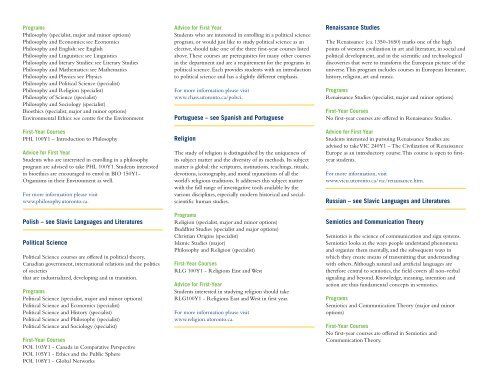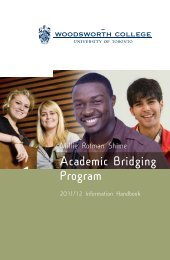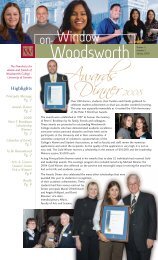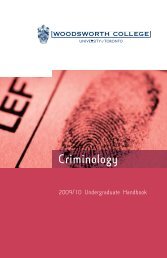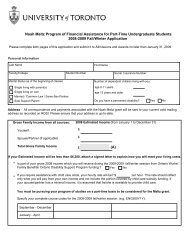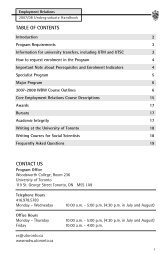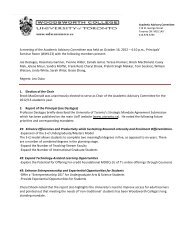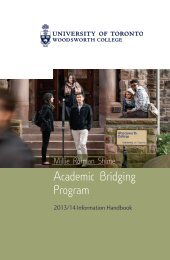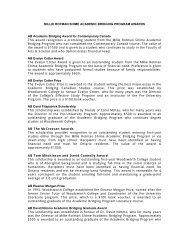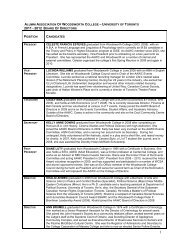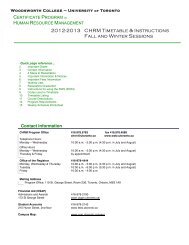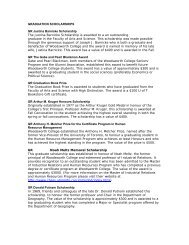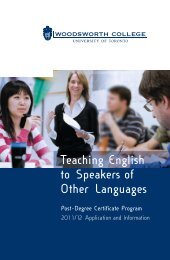ProgramsPhilosophy (specialist, major and minor options)Philosophy and Economics: see EconomicsPhilosophy and English: see EnglishPhilosophy and Linguistics: see LinguisticsPhilosophy and literary Studies: see Literary StudiesPhilosophy and Mathematics: see MathematicsPhilosophy and Physics: see PhysicsPhilosophy and Political Science (specialist)Philosophy and Religion (specialist)Philosophy <strong>of</strong> Science (specialist)Philosophy and Sociology (specialist)Bioethics (specialist, major and minor options)Environmental Ethics: see centre for the Environment<strong>First</strong>-<strong>Year</strong> CoursesPHL <strong>10</strong>0Y1 – Introduction to PhilosophyAdvice for <strong>First</strong> <strong>Year</strong>Students who are interested in enrolling in a philosophyprogram are advised to take PHL <strong>10</strong>0Y1. Students interestedin bioethics are encouraged to enrol in BIO 150Y1-Organisms in their Environment as well.For more information please visitwww.philosophy.utoronto.ca.Polish – see Slavic Languages and LiteraturesPolitical SciencePolitical Science courses are <strong>of</strong>fered in political theory,Canadian government, international relations and the politics<strong>of</strong> societiesthat are industrialized, developing and in transition.ProgramsPolitical Science (specialist, major and minor options)Political Science and Economics (specialist)Political Science and History (specialist)Political Science and Philosophy (specialist)Political Science and Sociology (specialist)<strong>First</strong>-<strong>Year</strong> CoursesPOL <strong>10</strong>3Y1 - Canada in Comparative PerspectivePOL <strong>10</strong>5Y1 - Ethics and the Public SpherePOL <strong>10</strong>8Y1 - Global NetworksAdvice for <strong>First</strong> <strong>Year</strong>Students who are interested in enrolling in a political scienceprogram, or would just like to study political science as anelective, should take one <strong>of</strong> the three first-year courses listedabove. These courses are prerequisites for many other coursesin the department and are a requirement for the programs inpolitical science. Each provides students with an introductionto political science and has a slightly different emphasis.For more information please visitwww.chass.utoronto.ca/polsci.Portuguese – see Spanish and PortugueseReligionThe study <strong>of</strong> religion is distinguished by the uniqueness <strong>of</strong>its subject matter and the diversity <strong>of</strong> its methods. Its subjectmatter is global: the scriptures, institutions, teachings, rituals,devotions, iconography, and moral injunctions <strong>of</strong> all theworld’s religious traditions. It addresses this subject matterwith the full range <strong>of</strong> investigative tools available by thevarious disciplines, especially modern historical and socialscientifichuman studies.ProgramsReligion (specialist, major and minor options)Buddhist Studies (specialist and major options)Christian Origins (specialist)Islamic Studies (major)Philosophy and Religion (specialist)<strong>First</strong>-<strong>Year</strong> CoursesRLG <strong>10</strong>0Y1 - Religions East and WestAdvice for <strong>First</strong>-<strong>Year</strong>Students interested in studying religion should takeRLG<strong>10</strong>0Y1 - Religions East and West in first year.For more information please visitwww.religion.utoronto.ca.Renaissance StudiesThe Renaissance (ca. 1350-1650) marks one <strong>of</strong> the highpoints <strong>of</strong> western civilization in art and literature, in social andpolitical development, and in the scientific and technologicaldiscoveries that were to transform the European picture <strong>of</strong> theuniverse. This program includes courses in European literature,history, religion, art and music.ProgramsRenaissance Studies (specialist, major and minor options)<strong>First</strong>-<strong>Year</strong> CoursesNo first-year courses are <strong>of</strong>fered in Renaissance Studies.Advice for <strong>First</strong> <strong>Year</strong>Students interested in pursuing Renaissance Studies areadvised to take VIC 240Y1 – The Civilization <strong>of</strong> RenaissanceEurope as an introductory course. This course is open to firstyearstudents.For more information, visitwww.vicu.utoronto.ca/vic/renaissance.htm.Russian – see Slavic Languages and LiteraturesSemiotics and Communication TheorySemiotics is the science <strong>of</strong> communication and sign systems.Semiotics looks at the ways people understand phenomenaand organize them mentally, and the subsequent ways inwhich they create means <strong>of</strong> transmitting that understandingwith others. Although natural and artificial languages aretherefore central to semiotics, the field covers all non-verbalsignaling and beyond. Knowledge, meaning, intention andaction are thus fundamental concepts in semiotics.ProgramsSemiotics and Communication Theory (major and minoroptions)<strong>First</strong>-<strong>Year</strong> CoursesNo first-year courses are <strong>of</strong>fered in Semiotics andCommunication Theory.
Advice for <strong>First</strong> <strong>Year</strong>A major or minor in Semiotics and Communication Theoryrequire one <strong>of</strong> the following first year courses: ANT <strong>10</strong>0Y1– Introduction to Anthropology, LIN <strong>10</strong>0Y1 – Introductionto General Linguistics, PHL <strong>10</strong>0Y1 – Introduction toPhilosophy or SOC <strong>10</strong>1Y1 – Introduction to Sociology. It isrecommended that students take one <strong>of</strong> these courses in theirfirst year <strong>of</strong> study.For more information, visitwww.vicu.utoronto.ca/vic/sctheory.htm.Serbian & Croatian – see Slavic Languages andLiteraturesSexual Diversity StudiesThe Sexual Diversity Studies program affords students thechance to develop an interdisciplinary focus on the interactionbetween society, culture, and sexuality; and the questions thisraises around identity including, but not limited to, gay, lesbian,bisexual, transgendered, queer or heterosexual communities,citizenship and how they change according to time and place.ProgramsSexual Diversity Studies (specialist, major, and minor options)<strong>First</strong>-<strong>Year</strong> CoursesThe Sexual Diversity Studies program does not <strong>of</strong>fer anycourses at the first-year level. The foundation courses for theSexual Diversity Studies program are UNI 255H1 – Historyand Perspectives in Sexual Diversity and UNI 256H1 –Sexualities: Social, Organizational, and Legal Contexts, <strong>of</strong>feredat the second-year level and open to first-year students.Advice for <strong>First</strong> <strong>Year</strong>Given the interdisciplinary nature <strong>of</strong> the program, a broadassortment <strong>of</strong> first-year courses would provide helpfulbackground, such as introductory courses in anthropology,sociology, English, philosophy or women and gender studies.For more information please visitwww.uc.utoronto.ca/sexualdiversity.Slavic Languages and LiteraturesThe Department <strong>of</strong>fers courses in the following languages,literatures, and cultures: Croatian, Czech, Estonian, Finnish,Hungarian, Macedonian, Polish, Russian, Serbian, Slovak, andUkrainian.ProgramsCroatian and Serbian Studies (major and minor options)Czech and Slovak Studies (major and minor options)Estonian Studies (minor only)Finnish Studies (major and minor options)Hungarian Studies (major and minor options)Polish Language and Literature (major and minor options)Polish Studies (major and minor options)Russian Language and literature (specialist, major and minoroptions)Russian Language (minor only)Russian Literature in Translation (minor only)Slavic Languages (specialist only)Slavic Languages and Literatures (specialist only)Ukrainian Language and Literature (specialist, major andminor options)<strong>First</strong>-<strong>Year</strong> CoursesEST <strong>10</strong>0Y1 - Elementary EstonianFIN <strong>10</strong>0Y1 - Elementary FinnishHUN <strong>10</strong>0Y1 - Elementary HungarianSLA <strong>10</strong>0Y1 - Elementary RussianSLA <strong>10</strong>5Y1 - Elementary CzechSLA <strong>10</strong>6Y1 - Elementary PolishSLA <strong>10</strong>8Y1 - Elementary UkrainianSLA <strong>10</strong>9Y1 - Elementary MacedonianSLA 1<strong>10</strong>H1 - Russian for Heritage SpeakersAdvice for <strong>First</strong> <strong>Year</strong>If you are a native or heritage speaker <strong>of</strong> a Slavic language, i.e.if you speak this language at home or spoke it as a child, youmust request the Department’s permission prior to enrollinginto a first-year language course. An interview with alanguage coordinator and a written placement test are usuallyrequired <strong>of</strong> all native and heritage speakers <strong>of</strong> Slavic languages.For more information please visit www.utoronto.ca/slavic.SociologySociological investigation ranges from the analysis <strong>of</strong> smallgroups to large social systems. Using a variety <strong>of</strong> methods andskills, sociology explores how individual and collective ways <strong>of</strong>thinking, feeling and acting are adapted by social experience.ProgramsSociology (specialist, major and minor options)Sociology and Economics (specialist)Sociology and Philosophy (specialist)Sociology and Political Science (specialist)Sociology and Urban Studies (specialist)<strong>First</strong>-<strong>Year</strong> CoursesSOC <strong>10</strong>1Y1 - Introduction to SociologyAdvice for <strong>First</strong> <strong>Year</strong>If you are interested in enrolling in a sociology program,you need to take SOC <strong>10</strong>0Y1 - Introduction to Sociology.This course is a prerequisite for many othercourses in thedepartment and is required for all programs in sociology.For more information, please visit:http://know.soc.utoronto.ca/index.phpSouth Asian StudiesThe South Asian Studies program examines the history andculture <strong>of</strong> India, Pakistan, Bangladesh and Sri Lanka. Theprogram emphasizes the history and development <strong>of</strong> SouthAsia’s political, cultural and social institutions, the nature <strong>of</strong>the economy and the significance <strong>of</strong> class and idealogy in themodern dynamics <strong>of</strong> continuity and change.ProgramsSouth Asian Studies (specialist, major and minor options)<strong>First</strong>-<strong>Year</strong> CoursesNEW 114Y1 – Introduction to South Asian StudiesAdvice for <strong>First</strong> <strong>Year</strong>Students who are interested in pursuing South Asian studiesshould take NEW 114Y1 in first year. Students are alsoencouraged to include a history, political science or religioncourse in first year to maximize their flexibility <strong>of</strong> programArts & Science <strong>First</strong>-<strong>Year</strong> <strong>Handbook</strong> 09<strong>First</strong>-<strong>Year</strong> Courses37


